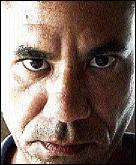
Written and directed by Scott Frank, who scripted the brilliant Get Shorty (1995) and the under-appreciated Out of Sight (1998), The Lookout (2007) is Frank's debut as a director, and an independent-minded gem of a film. Joseph Gordon-Levitt - you may remember him from the NBC sitcom, 3rd Rock from the Sun (1996-2001) - plays Chris Pratt, a young man who, before a tragic car accident of his own making, had a bright future.
The accident prevents Chris from being able to remember many things for extended periods of time and he is forced to carry a notebook to guide him through his life - such as it is - as a night cleaner at a bank. But Chris is still haunted by that deadly night, and he dreams of a better future.
The Lookout starts to take shape when Chris has a chance encounter with Gary Spargo, played by Matthew Goode, who claims to have dated his older sister, and who remembers Chris as a popular star-athlete. Gary invites Chris to join him and a pair of attractive females at his apartment and Chris leaps at the chance to return to the life he once had, before his recklessness took it all away. When Chris joins Gary at an out-of-the-way farmhouse for a Thanksgiving dinner, he meets Gary's seedy friends and is reeled into a plot to rob the bank he works at. Running at 99 minutes, The Lookout takes us on an insightful journey of redemption for a young man wracked with the sins of his past. Scott Frank's refreshing take on what could have been a procedural bank heist flick is filled with clever plot twists and fully-drawn characters, a departure from what normally comes out of Hollywood.
A Scanner Darkly
What is reality? This is a common theme explored in many of sci-fi writer Philip K. Dick's novels, including Do Androids Dream of Electric Sheep (adapted into the film, Blade Runner,1982), We Can Remember It for You Wholesale (which became Total Recall, 1990), and now in A Scanner Darkly (2006). Adapted and directed by Richard Linklater, A Scanner Darkly offers a bleak vision of a not-too-distant future where an undercover narcotics cop, played by Keanu Reeves, becomes addicted to Substance D, the permanently mind-altering drug he's been enlisted to fight, and starts to lose his own grip on reality. The film explores the notion that we all view the world in different ways - my reality may be vastly different from your reality - but, and this is crucial, still all have to live in the same world.
Running at 100 minutes, A Scanner Darkly is noteworthy for the rotoscoping technique utilised by the director, wherein the film was shot in live-action and then the footage was animated over, giving the movie a unique, semi-real look which enhances the journey Dick and Linklater take us on. PS: For other unique Linklater visions, see Dazed and Confused (1993) and Waking Life (2001); the latter also uses the rotoscoping technique.
Oldies but Goodies: The Discreet Charm of the Bourgeoisie.
Written and directed by the great Spanish director Luis Bunuel, The Discreet Charm of the Bourgeoisie (1972) skewers the values, attitudes and behaviour of the ruling class, the 'bourgeoisie' of the title. It does so, however, in a brilliantly funny and unusual way. In this way, the movie combines use and beauty in a manner consistent with the greatest art. Bunuel was strongly associated with the surrealist movement, and Discreet Charm is quite a surreal movie. Its plot centres on the increasingly complicated efforts of a group of friends to have dinner, and the running joke is that, because of countless interruptions, they are never able to eat.
Dreams, dreams within dreams, dreams within dreams within dreams, and remarkable randomness, however, mean that the audience's route is not direct. Instead, we are presented with the notion that the absurdity of the film's devices mirrors the absurdity of the world that these characters, and we, live in. Running at 102 minutes, The Discreet Charm won the Oscar for 'Best Foreign Film.'
For a double dose of Bunuel, consider also, Belle de Jour (1967) or 'The Exterminating Angel' (1962). The latter is an interesting companion piece to Discreet Charm, with another group of guests arriving for dinner, eating, and then finding they can't leave.
- Bruce Alexander and Omar Francis

